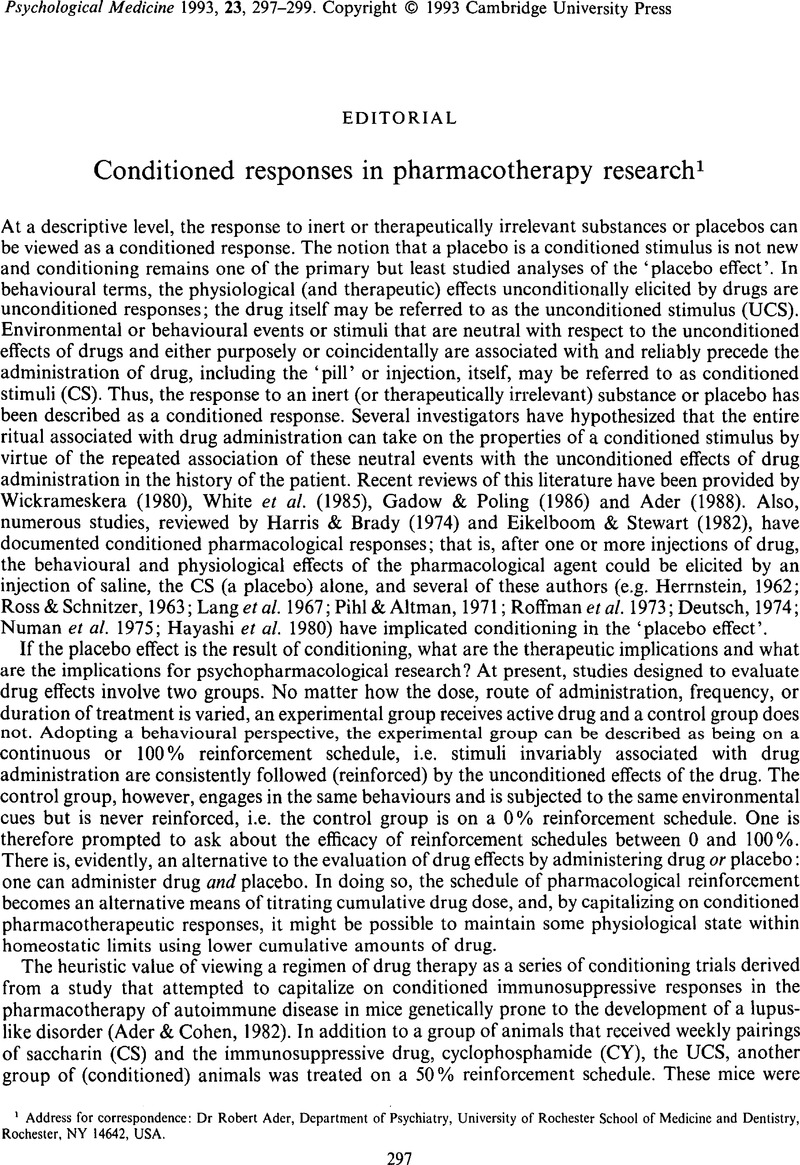Crossref Citations
This article has been cited by the following publications. This list is generated based on data provided by Crossref.
Ross, P.M
Whysner, J
Covello, V.T
Kuschner, M
Rifkind, A.B
Sedler, M.J
Trichopoulos, D
and
Williams, G.M
1999.
Olfaction and Symptoms in the Multiple Chemical Sensitivities Syndrome.
Preventive Medicine,
Vol. 28,
Issue. 5,
p.
467.
Flaten, Magne Arve
Simonsen, Terje
and
Olsen, Harald
1999.
Drug-Related Information Generates Placebo and Nocebo Responses That Modify the Drug Response.
Psychosomatic Medicine,
Vol. 61,
Issue. 2,
p.
250.
Crowe, Raymond R.
Goedken, Rhinda
Samuelson, Steve
Wilson, Ricky
Nelson, Jeffrey
and
Noyes, Russell
2001.
Genomewide survey of panic disorder.
American Journal of Medical Genetics,
Vol. 105,
Issue. 1,
p.
105.
Biller-Andorno, Nikola
2004.
The use of the placebo effect in clinical medicine — ethical blunder or ethical imperative?.
Science and Engineering Ethics,
Vol. 10,
Issue. 1,
p.
43.
Luijpen, Marijn W.
Swaab, Dick F.
Sergeant, Joseph A.
and
Scherder, Erik J. A.
2004.
Effects of Transcutaneous Electrical Nerve Stimulation (TENS) on Self-Efficacy and Mood in Elderly with Mild Cognitive Impairment.
Neurorehabilitation and Neural Repair,
Vol. 18,
Issue. 3,
p.
166.
Schneider, Rainer
2005.
Placeboeffekt und Bedeutung.
Psychologische Rundschau,
Vol. 56,
Issue. 3,
p.
201.
Schneider, Rainer
Grüner, Mauritz
Heiland, Alexandra
Keller, Martina
Kujanová, Zuzana
Peper, Martin
Riegl, Maximilian
Schmidt, Stefan
Volz, Petra
and
Walach, Harald
2006.
Effects of expectation and caffeine on arousal, well-being, and reaction time.
International Journal of Behavioral Medicine,
Vol. 13,
Issue. 4,
p.
330.
Doering, Bettina K.
and
Rief, Winfried
2012.
Utilizing placebo mechanisms for dose reduction in pharmacotherapy.
Trends in Pharmacological Sciences,
Vol. 33,
Issue. 3,
p.
165.
Enck, Paul
and
Klosterhalfen, Sibylle
2012.
Placebo mechanisms for drug dose reduction: what is the evidence?.
Clinical Investigation,
Vol. 2,
Issue. 11,
p.
1069.
Klinger, Regine
and
Flor, Herta
2014.
Placebo.
Vol. 225,
Issue. ,
p.
217.
Bavbek, S.
Aydın, Ö.
Sözener, Z.Ç.
and
Yüksel, S.
2015.
Determinants of nocebo effect during oral drug provocation tests.
Allergologia et Immunopathologia,
Vol. 43,
Issue. 4,
p.
339.
Enck, Paul
Chae, Younbyoung
and
Elsenbruch, Sigrid
2017.
Novel designs and paradigms to study the placebo response in gastroenterology.
Current Opinion in Pharmacology,
Vol. 37,
Issue. ,
p.
72.
Klinger, Regine
Stuhlreyer, Julia
Schwartz, Marie
Schmitz, Julia
and
Colloca, Luana
2018.
Neurobiology of the Placebo Effect Part II.
Vol. 139,
Issue. ,
p.
107.
Bingel, Ulrike
2020.
The Senses: A Comprehensive Reference.
p.
801.
Manaï, Meriem
van Middendorp, Henriët
Veldhuijzen, Dieuwke S.
van der Pol, Joy A.
Huizinga, Tom W. J.
and
Evers, Andrea W. M.
2020.
Pharmacological conditioning in the treatment of recent-onset rheumatoid arthritis: a randomized controlled trial study protocol.
Trials,
Vol. 21,
Issue. 1,
Bingel, Ulrike
2020.
Placebo 2.0: the impact of expectations on analgesic treatment outcome.
Pain,
Vol. 161,
Issue. Supplement 1,
p.
S48.
Hadamitzky, Martin
Lückemann, Laura
Pacheco-López, Gustavo
and
Schedlowski, Manfred
2020.
Pavlovian Conditioning of Immunological and Neuroendocrine Functions.
Physiological Reviews,
Vol. 100,
Issue. 1,
p.
357.
Kunkel, Angelika
and
Bingel, Ulrike
2023.
Placeboeffekte in der Schmerztherapie.
Der Schmerz,
Vol. 37,
Issue. 1,
p.
59.
Manaï, Meriem
van Middendorp, Henriët
van der Pol, Joy A.
Allaart, Cornelia F.
Dusseldorp, Elise
Veldhuijzen, Dieuwke S.
Huizinga, Tom W. J.
and
Evers, Andrea W. M.
2024.
Can Pharmacological Conditioning as an Add-On Treatment Optimize Standard Pharmacological Treatment in Patients with Recent-Onset Rheumatoid Arthritis? A Proof-of-Principle Randomized Clinical Trial.
Pharmaceuticals,
Vol. 17,
Issue. 1,
p.
110.





